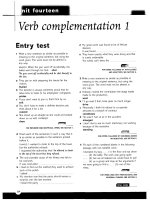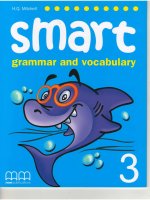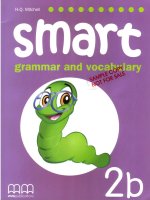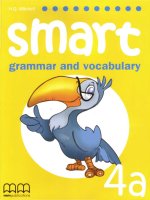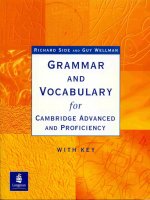smart grammar and vocabulary 5
Bạn đang xem bản rút gọn của tài liệu. Xem và tải ngay bản đầy đủ của tài liệu tại đây (39.81 MB, 106 trang )
present
SimPle
W Read the poster and m
and check your answer
Hi!
I'm Gary and I go
to Sutton
Youth
Club
with
my
best friend,
Sam,
on
Saturdays.
I usually have
drama lessons and he
plays chess. Then,
we
go bowling together. ,
It's great here! \
a ti n
When does
Gar~
go
to
the
~outh
club?
2
Does
Gar~
have
an
art
lesson?
e phrases with the pictures 1-5. Then, listen
G
•
Have
an
art
class!
•
Join
the
drama
club!
•
Go
bowling!
•
Play
chess!
3
What
does
Gar~'s
friend do at the
~outh
club?
4
What
do
Gar~
and
his
friend do together?
If
I\,
Present Simple
)
We
use the
Present
Simple:
• for actions and habits that happen regularly.
e.g. Sandra plays the guitar every afternoon.
• for permanent situations.
e.g.
My
father works in the city centre.
Adverbs
of frequency
go:
• before the main verb.
e.g.
Peter usually has an
art class on Fridays.
• after the verb
be
.
e.g.
Tina
is
always late
for school.
never
sometimes
often
usually
always
•
-
Ii
Prepositions
of time
•
at
six o'clock /
at
half
past
two,
etc.
at
noon /
at
night /
at
midnight /
at
the weekend
in the morning / afternoon / evening,
etc.
in
May
/
in
the summer,
etc.
in
my
free time
on Monday / on Friday morning / afternoon,
etc.
on weekdays
3
1
~
Complete wi
in
at
0
on
The
restaurant closes
______
midnight.
2 We have an art class
Wednesday afternoon.
3
Kelly and Paul don't
play
board games
_____
weekdays.
4 When we are on holiday, we often swim
in
the
pool
______
the morning.
S What's on
TV
ten o'clock tonight?
6
my free time, I enjoy playing the guitar.
7
My
grandparents often visit
us
______
the weekend and we have lunch together.
-9?
Complete th t e below with the things
you
usually do. Then,
discuss.
On
Monday
On
Tuesday
On
Wednesday .
On
Thursday
On
Friday
At
the weekend
On Monday, , usually
go
to
the park
with
my friends. What
about
you?
5
r
6
present
SitnPle
vs
present
progressive
o listen, read and match with the picture ®
a Geoff
is
a chef and he makes
interesting cakes and sweets.
In
this picture, he's making a
chocolate train.
b Daniel
is
a dentist.
In
this picture,
he's fixing a
girl's teeth.
e Ken
is
a photographer. He works for
a newspaper and he
loves his job.
d Stephanie
is
a secretary and in this
picture, she's writing an
e-mail.
e Karen
is
a mechanic.
In
this picture,
she's fixing a car.
f
Fay
is
an artist.
She
usually paints
pictures
of
the sea.
Present Simple
vs
Present Progressive
The
Present
Simple
is
used:
•
for
actions
we
do
every
day
or
actions
which
are
repeated
regularly.
e.g.
I
send
e-
mails
to
my
friends
every
week
.
•
for
permanent
situations
.
e.
g.
My
father
works
in
a
hospital.
Time Expressions
every
morning / day / week / year
etc.
on
Monday /
Tuesday
/
Friday
afternoon
etc.
in
the
morning / afternoon / evening
in
January /
February
etc.
in
the
summer / winter
etc.
at 7:
00
/ night /
the
weekend
etc.
always / usually /
often
/ sometimes /
never,
etc.
The
Present
Progressive
is
used
:
•
for
actions
that
are
happening
now,
at
the
moment
of
speaking
.
e.g.
Janet
is
feeding
her
cat
at
the
moment
.
l
Time Expressions
now,
at
the
moment
,-
Stative
Verbs
The
verbs
like,
love,
hate,
want
are
not
used
in
the
Present
Progressive
.
e.g
. My
sister
is
eating
chocolate
.
She
loves
sweets
.
"esson
2
~
Read, look and complete. Use the Present Progressive.
(
not!
s_le_e
-,-
p
__
d_o
___
ta_
ke
listen cook
play )
1 Bruce
What
________
the children
_______
_
in
their room?
Karen
They
________
to music.
2 Robbie
________
again.
He
wants to become a chef.
3
It's
11
o'clock at night, but Amanda
_______
_
She
computer games.
4 Look!
The
photographer a photo
of
our school.
-1?
Choo
a
b.
Do
you always
____________
your teeth before you go to
bed?
a brushing
b brush
2
Kathy
______
'
_____
her dog for a
walk
at
the moment.
a
is
taking b takes
3
___________
-,,-
.,
_walking
to school every day.
a hate
b
am
hating
4
The
mechanic
____________
in
the garden now.
He's
fixing the car.
a doesn't sit
b isn't sitting
5
on
the board
at
the moment?
a
Does
the teacher write b
Is
the teacher writing
6 Helen
____________
to become
an
artist.
a wants b
is
wanting
7
Jack
____________
chocolate.
a doesn't like b isn't liking
7
Lesso
. e what the
peopl~
usually do
doing now
in
the example.
visit her friends /
travel
to
Oxford
Sandlj
usuall
u visits her friends on
Saturday morning
but
she
is
travelling
~o
Oxford
now.
3 go shopping / go
to
the dentist
Elizabeth
__________
_
Saturday morning and what the are
2 clean his room /
write
e-mails
Henrlj
__________
_
4
plalj
basketball/ride
her bike
Vicklj
~~
(>
Complete with the Present Simple 0 the Present Progressive
Tom
is
a
farmer
and he's
got
lots
of
work
to
do
everlj dalj.
He
(1) (get up)
at
5
o'clock
everlj
morning and (2) (have) a big breakfast.
Then, he (3) (feed)
all
the
animals on the
farm
.
At
the
moment,
Tom (4)
_________
(not
do)
anlj
work
. He's
in
his bedroom.
He
(5) (wear)
his
pljjamas and he (6) (read) a newspaper.
Tom (7) (love) living on the farm,
but
e 8)
_________
(not
like) getting up earllj
in
the
8
Some
I
Any
I
No
I
Every
and
their
Compounds
~
Look
and
complete.
:ten
and
LA ;
check
your
answers.
0
W
Say
which
gadgets
you
have
got.
phone control
player camera
player )
1
MP3
___
_ 2
DVD
___
_
3 digital
___
_
4 mobile
___
_ 5 remote
___
_
-1-:11.'7
0'
~
Listen
and
read.
What
do
the
words
in
black
mean?
Discus
I
want
a mobile
phone
with
a camera.
We've
got
some
great
mobile
phones
here
and
every mobile
phone
has
got
a camera.
Excuse me, have you
got
any
DVDs?
No. There are
no
DVDs
in
this
shop.
9
Lesson
r
Some
/
An
/ No /
Every
We
use
some
:
We
use
any
:
• with plural countable nouns and with
uncountable nouns.
• in affirmative sentences.
e.g.
There
are some
great
computer
games
in this shop.
•
in
questions when
we
offer something politely.
e.g. Would you like some cake?
We
use no (not any):
• with plural countable nouns and with uncountable
nouns.
•
in
affirmative sentences to give a negative meaning.
e.g.
There
is
no (
not
any) milk
in
the fridge.
c
rr
d
ords.
• with plural countable nouns and with
uncountable nouns.
•
in
questions.
e.g.
Have you
got
any mobile phones?
• in negative sentences.
e.g.
I haven't
got
any
DVDs
.
We
use
every
:
• with singular countable nouns.
e.g.
Every
family in this town has
got
a
car.
e
every
, ,,.,~
1 e ' che
n.
Yuck!
_
-:~
:
r=~::=
:::-:~:_
':"
E
:~
e
'e
some /
any
in this
shop?
-
-:
;;::
no
any
, e
.J
I
S
'-'a:.·c . I now you don't eat meat.
- tares.
-
So
e E
el1d
:::~:::E"":"
Class
has
got a mo
bi
le phone.
-=~E
S no
any
':LJrn
~
ure
in
the living room. My dad's going to paint it.
r
some
People
someone
somebody
Things something
Places
somewhere
~
Look
and circle.
10
ComDounds
any
no
anyone no one
anybody nobody
anything nothing
anywhere
nowhere
some,
any,
no
every
everyone
everybody
everything
everywhere
every
• These compounds always go with
singular verbs.
e.
g.
Someone
is
in the house.
• These compounds are used
in
the same
way as
some, any,
no
and every, but they
are not followed by a noun.
e.g.
I can't find
my
MP3 player anywhere.
1
There's
someone / no one
in
the
street.
5
2
Someone / Everyone
is
waiting for
the
train .
3
Everyone / Anyone
is
running
across
the
bridge
.
4
No
one / Someone
is
in
the
stadium.
5
Is
anyone / someone
in
the
cinema?
4
3
J
~
Read and match.
What
did
~ou
see?
2 Wh
ere
did
~ou
find it?
3 Who
is
on
the phone?
4 Where did
Fred
go on
holida~?
5 Who saw the film?
6
What
did
~ou
take a picture of?
~~
':9?
Choo
a b or c
Jonathan goes
_______
with
his
MP3
pla~er
.
He
loves music.
a
ever~where
b
an~where
c somewhere
2
The
students didn't take
an~
photos
on
their trip because
____________
_
had a camera.
a
ever~one
b someone c no one
3
Let's go
_______
reall~
nice this weekend.
a
an~where
b somewhere
c
ever~where
4
Is
there
in
the bathroom?
a
an~where
b
no
one
c
an~one
5 There's
no
b
od
~
in
t
he
house.
_______
is
outside,
in
the garden.
a
Ever~thing
b
Ever~bod~
c Someone
6 There's
_______
in
the fridge.
What
are
we going
to
eat?
a nowhere b
an~thing
c nothing
~
Complete the dialogue with the words
in
the box.
(
nobod~
an~where
an~thing
ever~thing
Marie
Do
~ou
want
(1)
________
from the supermarket?
L
arry
No,
but I need a new
DVD
pla~er
.
Marie
You
can
get one
at
the supermarket.
L
arry
What? (2)
bu~s
DVD
p
l
a~ers
from the supermarket.
someone
somewhere
something
nobod~
nothing
nowhere
Marie
You're wrong.
The~'ve
got
(3)
________
there. Digital cameras, clothes
You
don't
need
to
go (4) else
to
shop.
11
~
Read and match.
What
did you
see?
2 Where did you find it?
3 Who
is
on the phone?
4 Where did
Fred
go on holiday?
5
Who
saw the film?
6
What
did you take a picture of?
~ChOO
a b
c
Jonathan
goes
_______
with
his
MP3 player.
He
loves music.
a
everywhere
c somewhere
2
The
st
udents didn't take any photos on their trip because
______
_
had a came
ra
.
a
everyone
b someone c no one
3 Let's go
_______
really
nice
this weekend.
a
anywhere
b somewhere c everywhere
4
Is
there
_______
in
the bathroom?
a
anywhere
b no one c anyone
5 There's nobody
in
the house.
_______
is
outside,
in
the garden.
a
Everything b Everybody c Someone
6 There's
_______
in
the fridge.
What
are we going
to
eat?
a nowhere b
anything c nothing
~
Complete the dialogue with the words
in
the box.
( nobody anywhere anything everything
Marie
Do
you wa
nt
(1)
________
from the supermarket?
L
arry
No,
but
I need a new
DVD
player.
Marie
You can get one
at
the supermarket.
esson
3
someone l
somewhere
someth
in
g
)
nobody
nothing J
nowhere .
L
arry
What? (2) buys
DVD
players from the supermarket.
Marie
You're wrong. They've
got
(3)
________
there. Digital came
ras,
clothes
You
don't
need
to
go
(4)
el
se
to
shop.
11
Quantifiers
~
Put
the
words
under
the
correct
heading.
Then,
listen
and
check
your
answers.
0
tea
onion
peach
lamb
sausage
kiwifruit
coffee
beef
lettuce
grapes
lemonade
drinks
~
~
meat
vegetables
~
Look
at the picture.
Listen
Which
description
is
wrong
d the two
descriptions
below.
®
12
a
There
are
tots
of
sausages on
the
tabte but th
ere
aren't man
steaks
.
There
'
!d
.
IS
Some
coffee
and
there
IS
a
titHe
I
lemonade.
b There are a
lot
of sausages on
the table
but
there are
onl~
a
few
steaks. There isn't much
lemonade and there isn't
an~
coffee.
Quantifiers
(much,
many,
a lot
of,
lots
of,
a few, a little)
We
use
much
with uncountable nouns
in
questions
and
in
negative
sentences
.
We
use
many with plural countable nouns, usually
in
questions and
in
negative
sentences.
e.g.
There
isn't much
cheese
in
the
fridge.
Let's
get
some.
e.
g.
Are
there
many students
in
the
classroom?
We
use
a lot of
and
lots
of
with
uncountable
and
plural
countable
nouns,
usually
in
affirmative
sentences
.
e.g.
There
are
a lot
of
sausages
on
the
table
.
There's
a lot of spaghetti
on
the
plate.
We
use
a few with plural countable
nouns
in
affirmative
sentences
.
e.g.
There
are a few oranges
in
the
fridge.
We
use
a little with uncountable
nouns
in
affirmative
sentences
.
e.g.
I've
got a little meat.
Let's
make a meat pie.
~
Complete with a few a little
Neal
I'm hungry.
Neal
Nice
idea. I'd like (5)
Elsa Me too. What's
in
the fridge? crisps
with
mine.
Neal
There are (1)
sausages
Elsa Me too. I think there are some
in
the
and there
is
(2)
cheese
.
cupboard.
Elsa
Have
we got any tomatoes?
Neal
Great. Would you like some orange juice?
Neal
Yes,
we've got
(3)
Elsa
No,
thanks. Have we
got
lemonade?
tomatoes.
Neal
No
. We haven't got any.
Elsa
OK,
let's make
(4)
Elsa
OK
.
I'll
just have
(6)
sandwiches.
water, then.
i?
look, read and tick
(V)
the correct sentence.
There aren't many grapes
in
the bowl.
There are lots
of
grapes
in
the bowl.
3 There
is
a
lot
of
sugar
in
the tea.
There
is
a
little
sugar
in
the tea.
2 There isn't much lemonade
in
the bottle.
There
is
a
lot
of
lemonade
in
the bottle.
4 There are a
lot
of
beans
in
the bag.
There are a
few
beans
in
the bag .
13
Lesson
~Ci
Ie the correct word .
I
don't
like pizza
with
a lot
of
/ a
few
cheese
on it.
2
It was a boring party because there weren't much /
many
people there.
3
I'd like a little / much salt on my salad.
4 Let's visit your cousin for a
few
/ a little days.
5 There isn't
many
/ much orange juice
in
this carton.
6 There are
lots
of
/ lot
of
peaches on the tree.
7 How
much /
many
onions do you need for this recipe?
~b
hoose a b
c
There aren 't
_______
grapes left. Let's go
to
the supermarket and get some.
a
many
b much c a little
2
I
only
want
_______
beef. I
don't
really like it.
a much
b a little c a
few
3
Can you get
me
________
sausages from the fridge?
a much
. b a
few
c a little
4
We haven't got
________
lamb. We need about
two
kilos and we've
only
got one.
a much
b a
little
clots
5
There aren't
_______
seashells on this beach .
a
many
b a
lot
c much
6
I'd like
_______
milk
in
my coffee, please.
a much
b a
few
c a
lot
of
~JJ
What are your eating habits? Play the game and tell your partner.
~
lot
of
lettuce. )
, don't
eat
many vegetables.
14
future
'going
to'
~
listen
and
complete
the
survey
below.
Then,
discuss
it
with
your
partner (Q' ,
' " 1
~
1
Where
are
you
going
to
go
next
summer?
2
Where
are
you
going
to
stay?
o hotel
o campsite
3
Who
are
you
going
to
go
with?
o parents
o cousins
4
What
are
you
going
to
do
there?
•
•
•
•
•
•
•
•
•
•
•
•
o go hiking
We
use the Future 'going to':
o do water
sports
o
play
beach
volleyball
• for plans and actions that we intend to do
in
the futur
e.
e.g. I'm going
to
travel
to
Spain next
summe
r.
• for predictions based
on
evidence.
e.
g.
Look
at
those clouds!
It's
going to rain.
o friend's house
o caravan
o friends
o classmates
o swim
o go sightseeing
o sunbathe .
Time Expressions
tomorrow / tonight
o go rock
climbing
next month/year/week/Tuesday, et
c.
this weekend/week/month,
etc.
in
an hour/a year,
etc.
soon
15
Lessor
~
Complete with the
Futu
going to the
verbs
in
the
box.
LA:.;
send stay
not
sunbathe
not
swim do
not
travel )
1
Mary
________
at
a h
otel
near the beach next weekend.
2
________
you
________
Bob
an e-mail tomorrow?
3
I
________
to
Brazil
ne
xt summer. I haven't
got
any money.
4 Kathy and Beth
________
. They hate sitting
in
the sun.
5 We
________
in
the pool. It's cold.
6 Mike
________
lots
of
water
sports when
he
goes on holiday.
He
just loves the
sea
.
~
Look
at
the
pictures
a the
prompts
below
and
write
sentences
with
the
Futu
going
to
1 Tony / play /
football
Tonl,J
isn't going
to
plal,J
football.
He's going
to
plal,J
basketball
2
Mr
Jones
/ buy / car
3
Mr
and Mrs Felix / crash into /
wall
4 Kelly / go rock climbing
16
-,essen 5
~
Read
Lyn's
plans for her holiday and answer the questions,
as
in
the example.
A j
My
holiday
Monday
Tuesday
Wednesday
Thursday
Friday
Saturday
Sunday
go
hiking
meet
my
cousins
go
sightseeing
have
lunch
at a
local
restaurant
do
water sports
buy
souvenirs
travel
back
home
Is
she going
to
meet her cousins on Monda\:j?
No she Isn't. She's gOing
to
go
hiking
2
What
is
she going
to
do
on Thursda\:j?
3
What
is
she going
to
do
on Saturda\:j?
Is
she going
to
go
sightseeing on Sunda\:j?
:::>
What
is she going
to
do on Tuesda\:j?
6
Is
she going
to
bU\:j
souvenirs on Frida\:j?
~ Write three sentences about
wh
you
are going to do
nd
wha
you
aren't going to do
next weekend.
1
________
__
________
________________________________
__________
~
___
2
__
____________________
____
__
________________
__________
__
______
___
3
__
____________________
__
________
__
______
____
____
______
__
______
___
17
~
Let's
I
How
aboUt
? I
WhY
don't
we
?
W
look
and match. Then, listen and check your answer ®
a a quiz show
b the news
c the weather forecast
d a
wildlife
documentar~
3
e a
realit~
show
f a sports programme
9 a cartoon
6 7
1?
look
at
the
TV
programmes
in
activity
1.
What do
you
think of them? Use the
adjectives
below.
C nterestin
g
fun
boring
awful
exciting
funn~
sill~
~
Read and listen. Which programme do they decide to
watd
®
18
Tanya
How about watching
TV?
Melissa
OK.
What's on?
Tanya
There's a sports programme
on
Channel
5.
Melissa
No,
that's boring.
Wh~
don't
we watch a
,
,,,
j
-
I
~
documentar~
about tigers?
Tanya
I
don't
know
He~!
There's a quiz show on
Channel 2. Let's watch that.
Melissa
That's not exciting!
Tanya
OK
. A wildlife
documentar~
then.
•
We
use let's + verb and
Why
don't we + verb? to
suggest something:
•
We
also use How about + verb-ing? to suggest
something:
e.g.
Let's
watch a cartoon. e.
g.
How
about
watching that
new
reality show?
I'm bored.
Why
don't we watch
TV?
m
How about playing
football
today?
2
My
car doesn't work.
3
Why
don't
we buy some new clothes?
4 There's a sports programme on
TV
.
5 Let's get some hamburgers.
6
I
want
to
watch
TV.
a Let's watch it!
b
No,
it's raining.
-Jesson
6
c
No
thanks. I'm not hungry.
d
Yes,
let's go
to
the shopping centre.
e Let's take it
to
the mechanic.
f
Why? What's on?
5?
Look
at
the
pictures and make suggestions using the prompts.
Alan
The
news
is
really boring.
(watch / quiz show)
Will Let's
2 David It's raining today.
(play
/ computer games)
Jenny
Why
______________________________________
?
3
Philip
Is
it
going
to
rain tomorrow?
(watch / weather forecast)
Jane I
don't
know. Wh y
____________________________
?
-
Diane
Do
you
want
to
watch a
wildlife
documentary?
(play /
chess)
Frank
No.
How
___________________________________
?
1J
6]
Look
at
the
TV
guide and make
su
estions.
How
about
watching
the
new
reality show?
5.00 Cartoon
7.00
The
newS
8.00
The
weather forecast
9.00
REALITY
SHOW
7.00 Quiz show
8.00 Wildlife documentary
9.00 Sports programme
f-
lffAlI~CAA.
,,'i\lG~
_
No, reality
shows
are
boring. Let's
Spelling Check
~
Look,
read and circle the correct
words.
3
two
/
too
4
sea
I
see
5 no /
know
I
6
for
/ four
20
~
List
and .
e
co
olum
0
lsi
/zl
IIz/
writes
comes
watch
es
looks
brushes
sleeps
cleans
rides
sits
dan
ces
does
3;>
L
LAJ
t /s/
and circle
/z/ s
in
u . red
blue
s O
/IZ/
green
Then,
Dave and Jade
Dave
is
m~
brother and
he
loves cars
He
usuall~
crashes because
he
drives
too
fast!
He
takes
the cars home and fixes them,
And the
ver~
next
da~,
he's on the road again.
Jade
is
m~
sister and
she
plays the guitar
One
da~
she
wants
to
be
a pop star!
But she's
so
bad I
can't
take it
an~
more,
Luckil~
when
she
sings,
she
closes
her door.
-L\
t>
Read.
wrihn~
COrne
also
I
too
We
use also and too when we want to add something else to
what
we
have
already
said
.
•
Also usually
goes
before
the
main verb and
after
the
verb
be
.
•
Too
usually
goes
at
the
end
of
a sentence.
e.g. I've
got
a
pet
dog. I've also
got
a
pet
cat. I've
got
a goldfish,
too
.
5? Complete the
sentences
with
also
too
I love watching reality shows. I love cartoons.
2
I've
got
a new
MP3
player. I've
got
a new mobile phone.
3
Kathy likes sausages and beef.
She
eats lots
of
vegetables,
___
-=
__
4 When I go on holiday, I usually do water sports and I
___
-=
__
sunbathe on the beach .
5
On
Wednesdays, my sister and I have a drama lesson together.
On
Fridays, we have
an
art
class,
_____
_
6J
Write a few
sentences
about yourself
usin
also
r
too
rite about:
• the things you've got • the things you like eating
•
what
you do every day
•
what
kind
of
TV
programmes you watch
21
W Match.
~
0
-=·
=-
1 send
2
play
3 do
4 go
5
buy
water
sports
souvenirs
e-mails
chess
rock climbing
j?
Look
and do the crossword.
[F=ri5
•
(1
)
1:!
•
~
~
-'
(2)
(3)
~ (5
)
~
Complete with the Present Simple the Present Progressive 0 the verbs
in
brackets.
1
2
3
4
5
6
Linda
_________
(have) drama lessons every weekend.
_________
(make) dinner
at
the moment.
Dad
Ian
_________
(not eat)
meat
because he's a vegetarian.
_________
(want)
to
become a famous actress.
_________
(go)
out
with
his
friends very often.
Lucy
Jerry
Bill
_________
(not work) now.
He
_________
(watch) a
sports programme.
1?
Complete wi
at
in
on
I usually
wake
up very early
_____
the morning.
2 The concert
is
July.
3 Frank
is
sunbathing
_____
the moment.
4
Sally never stays up late weekdays.
5 I
always
get up
_____
Bam.
6 Tom has a German lesson
_____
Friday afternoons.
22
~
hoo
c'n
"'r"
words.
1 There aren't some /
any
sausages
in
the bag .
2
I'm hungry. I
want
something /
anything
to
eat.
3 There
is
a
little
/ a
few
orange juice
in
the fridge. Drink it.
4
Lots
oJ
/
Much
people take the
bus
to
work.
S Every /
Everywhere
school
has
got a gym.
6 I can't find the remote control
anything
/
anywhere
.
7 There
is
no /
any
milk
in
the fridge.
8 There isn't
much /
many
money
in
my wallet, but you
can
take it.
9
I've
got
a
few
/ a
lot
of
CDs
. I think about 100!
10
There's someone / no one at home. Everyone's at work.
1
2
3
~
Write three sentences about what
you
are going to do xt summer.
-t?
Task-based
activity
A.
00
a ictures and
discuss
in
groups.
Us
let's How about
? Why don't
?
No, it's cold
today.
Why
don't
we ?
.
r-
- I .
Report your group's decision to the
class.
23
o
Look
and r ad.
Choose
the correct words and write them
on
the lines.
There
is
one extra word.
Example
This person cooks
in
a restaurant, a hotel, etc.
People can stalj
in
this building when thelj
go
on
holidalj, but thelj must palj.
2
This
pe
r
son
fix
es
cars
.
3
You usualllj bUlj these for ljour
famillj
and friends when ljou go on holidalj.
4 People sleep
in
tents when thelj go
on
holidalj there.
S
People go there
to
swim when thelj are
on holidalj.
~
Look
and read. Writ
yes
no
Example
Two children
are
playing chess.
One
of
the children
is
eating
grapes.
2
The
bOlj
with the black hair
is
watching a wildlife documentarlj.
. .
3
Everlj
child
has
got a mobile phone.
24
ljes
chef
4
One
of the children
is
going
to plalj the guitar.
S
There
are
two
musical instruments
in
the room.
6
There
are
lots of magazines
on
the table.
caravan
souvenirs


